

Sentence Completion Exercise - Parallelism - Using Parallel Structures. Editing Exercise: Faulty Parallelism - Practice in Correcting Errors in Parallel Structure. Practice in Placing Modifiers Where They Belong - Editing Exercise - Practice in Correcting Misplaced, Dangling, and Squinting Modifiers. Practice in Using Relative Pronouns With Adjective Clauses - Exercise in Adding Relative Pronouns. Expanding Sentences With Adjective Clauses - A Sentence-Expanding Exercise. This exercise will give you practice in building and expanding sentences with adjective clauses.
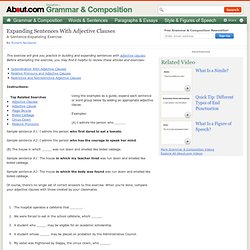
Before attempting the exercise, you may find it helpful to review these articles and exercises: Instructions: Using the examples as a guide, expand each sentence or word group below by adding an appropriate adjective clause. Examples: (A) I admire the person who _____. Sample sentence #1: I admire the person who first dared to eat a tomato. Correcting Run-on Sentences Through Coordination and Subordination - Guidelines, Examples, and Exercises.
In the article Correcting a Run-on Sentence With a Period or Semicolon, we discussed two simple ways of breaking up a fused sentence.
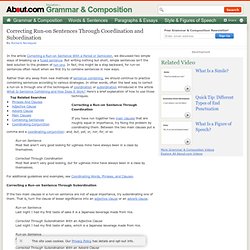
But writing nothing but short, simple sentences isn't the best solution to the problem of run-ons. In fact, this might be a step backward, for run-on sentences often result when we first try to combine sentences in new ways. Rather than shy away from new methods of sentence combining, we should continue to practice combining sentences according to various strategies.
Review Exercises: Subject-Verb Agreement - Three Exercises in Subject-Verb Agreement. Note: To view these three exercises without ads, click on the print icon near the top of the page.
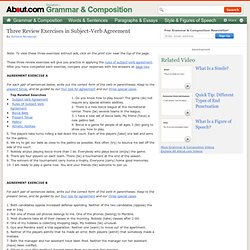
These three review exercises will give you practice in applying the rules of subject-verb agreement. After you have completed each exercise, compare your responses with the answers on page two. For each pair of sentences below, write out the correct form of the verb in parentheses. Keep to the present tense, and be guided by our four tips for agreement and our three special cases. 1. For each pair of sentences below, write out the correct form of the verb in parentheses. 1. Body Idioms Quiz - 2. Choose the correct word or phrase to complete the body idiom in the question.
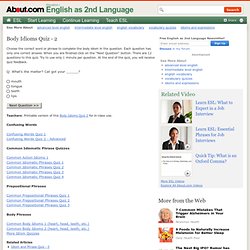
Each question has only one correct answer. When you are finished click on the "Next Question" button. There are 12 questions to this quiz. Try to use only 1 minute per question. Editing Exercise - Correcting Problems With Irregular Verbs. Proofreading for Errors in Verb Tense - Regular and Irregular Verbs - Writing Exercise. Correcting a Run-on Sentence With a Period or Semicolon - Guidelines and Practice Exercises - Run-on Sentences. The simplest way to correct a run-on sentence (also known as a fused sentence) is with a mark of punctuation--a period or semicolon.
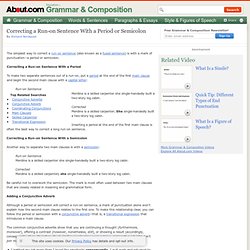
Correcting a Run-on Sentence With a Period To make two separate sentences out of a run-on, put a period at the end of the first main clause and begin the second main clause with a capital letter: Appositives. Verb and Preposition Collocations. Word Choice : Grammar Girl. Mignon Fogarty is the creator of Grammar Girl and the founder and managing director of Quick and Dirty Tips.

A magazine writer, technical writer, and entrepreneur, she has served as a senior editor and producer at a number of health and science web sites. She has a B.A. in English from the University of Washington in Seattle and an M.S. in biology from Stanford University. Mignon believes that learning is fun, and the vast rules of grammar are wonderful fodder for lifelong study. She strives to be a friendly guide in the writing world. Her archenemy is the evil Grammar Maven, who inspires terror in the untrained and is neither friendly nor helpful. Grammar Girl provides short, friendly tips to improve your writing. To book a lecture event with Mignon Fogarty for your company or organization, contact Macmillan Speakers. Follow Mignon on Google+, Twitter, Facebook, StumbleUpon, LinkedIn, and Pinterest.
Awards. Popular Proverbs - A Subject-Verb Agreement Quiz. Editing Exercise - Correcting Sentence Fragments II - Why Do We Keep Pets? - Unedited version. This exercise (like Correcting Sentence Fragments I) offers practice in identifying and correcting needless sentence fragments during the editing stage of the writing process.
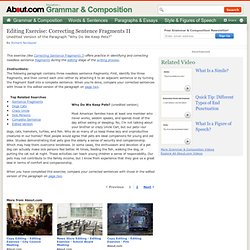
Instructions: The following paragraph contains three needless sentence fragments. First, identify the three fragments, and then correct each one--either by attaching it to an adjacent sentence or by turning the fragment itself into a complete sentence. When you're done, compare your corrected sentences with those in the edited version of the paragraph on page two.
Why Do We Keep Pets? (unedited version) Most American families have at least one member who never works, seldom speaks, and spends most of the day either eating or sleeping. Dangling Modifiers. Restrictive Clauses. Style : Grammar Girl. Sentence Building with Absolutes - Sentence Combining Exercises with Absolutes. Sentence Fragment Editing Exercise I - Correcting Needless Sentence Fragments in Paragraphs. This exercise offers practice in identifying and correcting needless sentence fragments during the editing stage of the writing process.
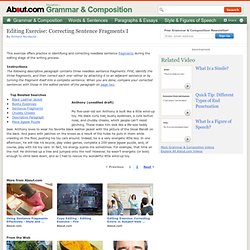
InstructionsThe following descriptive paragraph contains three needless sentence fragments. First, identify the three fragments, and then correct each one--either by attaching it to an adjacent sentence or by turning the fragment itself into a complete sentence. When you are done, compare your corrected sentences with those in the edited version of the paragraph on page two. Anthony (unedited draft)
Embedded Questions. Absolutes. Identifying Verbals - Exercise in Identifying Participles, Gerunds, and Infinitives - What Are Verbals? Sentence Building With Coordinators - Combining Sentences With Coordination. Correcting Phrase Fragments - Exercise in Correcting Needless Sentence Fragments. LearningSpace - The Open University. Participial Phrases. Parallelism. Editing Exercise: Correcting Errors in Subject-Verb Agreement.
Exercise in Expanding Sentences With Appositives - Sentence Expanding Exercise - Appositives. Noun Clauses. It/That Constructions. Review Exercise - Basic Subject-Verb Agreement - Correct Verb Forms. Review Exercise: Revising Sentences with Basic Modifiers - Using Adjectives, Adverbs, and Prepositional Phrases Effectively. Paraphrasing text - Paraphrasing text.
Subject-Verb Agreement Exercise - Combining Sentences With Correct Verb Forms. Exercise in Adding and Arranging Participial Phrases - Sentence Building Exercises - Practice in Avoiding Misplaced Modifiers. Popular Proverbs - A Subject-Verb Agreement Quiz. Exercise in Building and Connecting Sentences - Combining Sentences with Transitional Words and Phrases - Coherence and Cohesion. Daily Page for Students of English. Complex Question Formation. Exercise in Identifying Infinitive Phrases - Practice in Distinguishing Infinitive Phrases From Prepositional Phrases. Exercises in Identifying Subjects and Verbs. Online. Introductory Phrases. Restrictive and Nonrestrictive Adjective Clauses - Exercise in Identifying the Two Types of Adjective Clauses. In Subordination with Adjective Clauses, we learned how an adjective clause functions like an adjective to modify a noun.
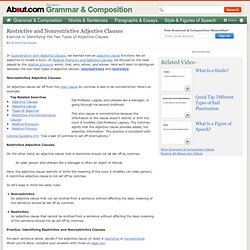
In Relative Pronouns and Adjective Clauses, we focused on the roles played by the relative pronouns which, that, who, whom, and whose. Here we'll learn to distinguish between the two main types of adjective clauses: nonrestrictive and restrictive. Nonrestrictive Adjective Clauses An adjective clause set off from the main clause by commas is said to be nonrestrictive. Here's an example: Old Professor Legree, who dresses like a teenager, is going through his second childhood. This who clause is nonrestrictive because the information in the clause doesn't restrict or limit the noun it modifies (Old Professor Legree). Restrictive Adjective Clauses On the other hand, an adjective clause that is restrictive should not be set off by commas.
An older person who dresses like a teenager is often an object of ridicule. Exercise in Using Specific Descriptive Details in Sentences - Building sentences and paragraphs with specific details. This exercise will give you practice in using specific descriptive details to create a vivid impression of a particular place.
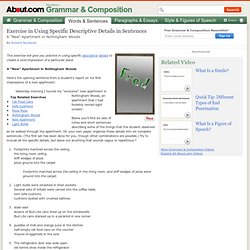
A "New" Apartment in Nottingham Woods Here's the opening sentence from a student's report on his first impressions of a new apartment: Yesterday morning I toured my "exclusive" new apartment in Nottingham Woods, an apartment that I had foolishly rented sight unseen. Below you'll find six sets of notes and short sentences describing some of the things that the student observed as he walked through the apartment. On your own paper, organize these details into six complete sentences. Parenthetical Statements. Object Complements. English Tense Review for Advanced Level English ESL EFL TESL TOEFL Classes. It's back-to-school time. Before you or your students get down to studying the specifics of various grammar structures, it is a good idea to review the basic English tenses.
If you are an advanced student, a review will help remind you of the tenses and also point out any weaknesses or insecurity that you may have. If you are an upper level student but not yet aware of all the tenses, these exercises will make a good introduction to some of the important structures ahead. For an overview of conjugation in detail of all 12 tenses in English, use the tense tables for reference. Teachers can use theses guides on how to teach tenses for further activities and lesson plans in class The following exercises serve two purposes: Exercise in Identifying Sentences by Structure - Identifying Simple, Compound, Complex, and Compound-Complex Sentences. In terms of structure, sentences can be classified in four ways: simple (one independent clause)compound (at least two independent clauses)complex (an independent clause and at least one dependent clause) compound-complex (two or more independent clauses and at least one dependent clause) This exercise will give you practice in identifying these four sentence structures.
NOTE: To view the exercise without ads, click on the printer icon near the top of the page. Instructions: The sentences in this exercise have been adapted from poems in two books by Shel Silverstein: Where the Sidewalk Ends (HarperCollins, 1974) and Falling Up (HarperCollins, 1996). Identify each of the following sentences as simple, compound, complex, or compound-complex. When you're done, compare your answers with those on page two. I made an airplane out of stone. Reducing Adverbial Clauses. Time clauses with "while" and "when" can be reduced by deleting the subject and "be" verb.
While I was eating dinner, I watched television. While eating dinner, I watched television. When you are in Rome, (you) do as the Romans do. When in Rome, do as the Romans do. If there is no "be" verb, change the verb in the subordinating clause to its -ing form. English Tense Review Advanced - Conjugating Verbs. Read the following short story and conjugate the verbs. Once you have conjugated the verb, check your answers on the answers page. John Tense? _____ (always travel) a lot. In fact, he Tense? Exercise in Identifying Sentences by Function - Identifying Declarative, Interrogative, Imperative, and Exclamatory Sentences. In terms of their function, sentences can be classified in four ways: declarative (making a statement)interrogative (asking a question)imperative (expressing a request or command)exclamatory (expressing strong feelings) This exercise will give you practice in identifying these four functional types of sentences.
NOTE: To view this exercise without ads, click on the printer icon near the top of the page. Instructions: Identify each of the following sentences as declarative, interrogative, imperative, or exclamatory. When you're done, compare your answers with those on page two. Types of Subjects and Objects. Identifying English Tenses. English Language Study Practice - Three Word Verbs Phrasal Verbs for ESL EFL English Students Study Quiz. Inversions. QuestionsNegativesPrepositional Phrases of Place (Necessary) The prepositional phrase is necessary here, because without it, the sentence would be incomplete: ("is a book" is not a complete sentence.)
Inversion is necessary. Without the prepositional phrase, the sentence the food was too spicy is still complete. This structure is typically used with linking verbs (be, appear, seem, etc.) or words that function as linking verbs. In some situations, the conditional if is omitted and an inversion is used in its place. Sentence Changes - Grammar Practice Quiz - Study for Advanced Level Exams.
Sentence change quizzes are common in a wide variety of important international tests, most importantly on Cambridge exams such as the First Certificate, CAE and others. The key to changing sentences is to keep the meaning the same, though sentence structure changes. ESL Colloquial Pairs Quiz - Pairs of Colloquial Phrases. The term 'colloquial paris' refers to common set phrases in English. In this quiz, colloquial pairs of words that traditionally come together in a specific order are presented to choose from to fill a gap.
Level 490 Grammar Topics. Sentence Changes - Grammar Practice Quiz - Study for Advanced Level Exams. Complete the second sentence so that it is similar in meaning to the first. Use the word after the double slash (//) to complete the blank. Emphatic Expressions Quiz - Strong Collocating Emphatic Expressions. Grammar : Grammar Girl. ESL Colloquial Pairs Quiz - Pairs of Colloquial Phrases. Idiom and Phrase Quiz - 3. Choose the correct word or phrase to complete the idiomatic phrase in the question. Each question has only one correct answer. When you are finished click on the "Next Question" button. There are 12 questions to this quiz. Try to use only 1 minute per question. At the end of the quiz, you will receive quiz feedback.
Confusing Words. Preposition Collocations with Be. Punctuation : Grammar Girl. Exercise in Making Verbs Agree With Their Subjects - Subject-Verb Agreement Review Exercise. If you have studied the guidelines for Correcting Errors in Subject-Verb Agreement, you should have no problem completing this short review exercise. To view the exercise without ads, click on the print icon near the top of the page. Instructions:For each pair of sentences below, write the correct form of the verb in parenthesis.